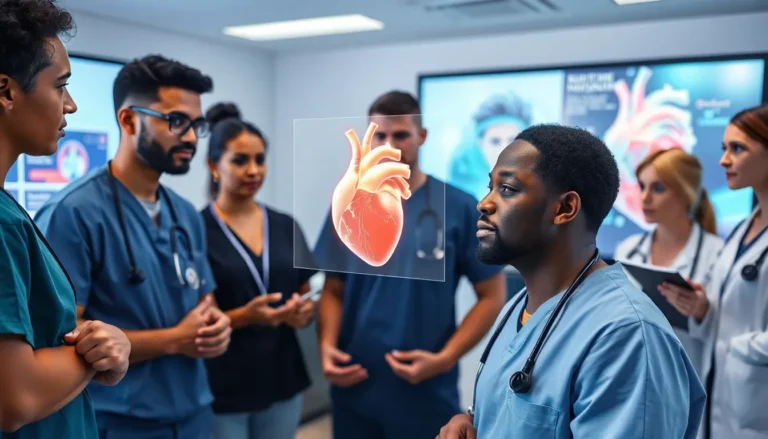Table of Contents
ToggleIn a world where your fridge can remind you to buy milk and your coffee maker knows just how you like your brew, the Internet of Things (IoT) is more than just a tech buzzword—it’s a revolution. Imagine a future where everyday objects communicate seamlessly, making life easier and more efficient. Sounds like sci-fi? Well, it’s already happening, and it’s time to get on board.
Overview of Internet of Things Course
An Internet of Things course covers essential concepts, technologies, and applications. It provides foundational knowledge on how devices communicate within the IoT ecosystem. Participants learn about various IoT protocols, architectures, and security measures.
Real-life examples illustrate the practical applications of IoT, from smart homes to industrial automation. Students explore the role of sensors and actuators in enabling connectivity. The course also delves into data analytics, emphasizing the importance of analyzing data generated by IoT devices.
Hands-on projects allow individuals to design and implement IoT systems. Engaging labs offer opportunities to work with hardware components and software platforms. By the end, participants gain skills that prepare them for careers in IoT development or management.
Market demand for IoT expertise continues to grow. Professionals with knowledge in IoT technologies often find increased job opportunities. Employers seek individuals who understand not only the technical aspects but also the strategic implications of IoT on business operations.
Certification in this field enhances a resume and demonstrates commitment to the burgeoning IoT landscape. Many institutions and online platforms offer accredited courses, ensuring high-quality education. Course formats vary, catering to different learning preferences, from in-person classes to online modules.
Overall, this course provides a comprehensive overview of IoT, enabling learners to leverage connected technologies effectively.
Course Structure and Content

The Internet of Things course features a well-defined structure that encourages comprehensive learning. With a focus on practical applications, this course equips participants with foundational and advanced IoT knowledge.
Modules Covered
- Introduction to IoT: Covers IoT fundamentals, including its history and impact on various industries.
- IoT Architecture: Explores different architectural models and components essential for IoT systems.
- Communication Protocols: Discusses widely-used protocols like MQTT and CoAP, emphasizing their roles in IoT connectivity.
- Data Management: Focuses on data collection, storage, and analytics techniques to derive insights from IoT devices.
- Security: Examines security threats and best practices to protect IoT networks from vulnerabilities.
- Application Development: Engages learners in designing IoT applications with hands-on projects and real-world scenarios.
Learning Outcomes
Participants achieve several key learning outcomes upon course completion. They gain proficiency in IoT concepts and their applications across sectors. Understanding various protocols enhances their ability to connect devices efficiently. Developing IoT solutions enables creativity while addressing industry challenges. Participants improve skills in data management, ensuring they can handle and analyze large datasets. Enhanced awareness of security practices ensures they can implement protective measures effectively. Lastly, they prepare for evolving IoT job roles and responsibilities, increasing their employability in this growing field.
Teaching Methodology
This course utilizes a diverse range of teaching methodologies to ensure participants gain a robust understanding of IoT concepts and applications. Engaging learning experiences promote skill development in real-world scenarios.
Hands-On Projects
Experiential learning forms the backbone of the course. Participants engage in hands-on projects that challenge them to design and implement IoT systems. Tools and platforms used include Arduino, Raspberry Pi, and various sensor technologies. Collaborative assignments encourage teamwork and creativity in developing innovative solutions. Each project culminates with presentations, allowing individuals to showcase their work and receive constructive feedback.
Case Studies and Real-World Applications
Real-world case studies provide context and relevance to the course material. Participants analyze successful IoT implementations across sectors like healthcare, agriculture, and smart cities. These examples illustrate challenges faced during implementation and solutions deployed. Discussions around case studies enhance critical thinking and help students understand practical applications of theoretical concepts. Each session fosters an environment for learning, connecting classroom knowledge with market needs.
Instructor Credentials
Instructors for the Internet of Things course possess extensive experience in relevant fields. Each instructor brings a solid academic background, often holding advanced degrees in computer science, engineering, or information technology. They actively work in IoT-related industries, ensuring that their expertise reflects current market trends and practices.
Certification in industry-recognized frameworks often accompanies their qualifications, enhancing their authority as educators in IoT. Many instructors contribute to research in IoT technologies, publishing papers and engaging with the academic community.
Combining theoretical knowledge with practical application, they guide participants through complex concepts with clarity. Real-world examples drawn from their professional experiences enrich the learning environment. Participants benefit from instructors who understand the intricacies of IoT architecture, communication protocols, and security measures.
Interactive teaching methods foster engagement and collaboration. Each instructor employs a variety of pedagogical techniques, adapting to diverse learning styles among participants. Frequent opportunities for hands-on experience with tools like Arduino and Raspberry Pi help learners grasp the concepts effectively.
Instructors also emphasize the importance of soft skills alongside technical training. Communication, teamwork, and problem-solving emerge as key competencies for success in IoT careers.
Feedback loops during projects allow participants to refine their skills under the guidance of knowledgeable mentors. They actively support students in developing innovative IoT solutions, preparing them for evolving job roles in the field.
Overall, the diverse expertise and dedication of instructors significantly enhance the quality of the Internet of Things course, ensuring that participants receive a comprehensive education.
Student Feedback and Reviews
Students consistently praise the Internet of Things course for its practical approach. Many appreciate the hands-on projects that enhance their learning experience. Participants frequently highlight the use of tools like Arduino and Raspberry Pi as particularly valuable for gaining real-world skills.
Course evaluations often reflect satisfaction with the diverse teaching methodologies. Instructors receive commendations for their engaging and interactive teaching styles. Students find that collaborative assignments foster teamwork and deepen understanding of the material.
Learners report significant improvement in their IoT knowledge and skills. They feel well-equipped to tackle industry challenges upon course completion. Alumni frequently share that their certification has positively impacted their job prospects.
Feedback indicates that real-world case studies effectively connect theoretical concepts with practical applications. Students enjoy analyzing successful IoT implementations across various sectors, which enhances critical thinking skills. This relevancy to market needs helps prepare participants for evolving roles in the IoT field.
Many students express gratitude for the instructors’ extensive industry experience. They highlight that this expertise enriches their learning, as instructors integrate current market trends into lessons. Additionally, the emphasis on soft skills alongside technical training is appreciated, ensuring students approach their careers well-rounded.
Reviews typically underscore the comprehensive structure of the course. Participants find that each module builds a solid foundation, ultimately leading to proficiency in essential IoT concepts. Overall, the positive feedback reflects a course that effectively prepares students for careers in the fast-growing IoT landscape.
The Internet of Things course offers a robust pathway for individuals eager to dive into the rapidly evolving tech landscape. With a curriculum designed to bridge theory and practice, participants gain invaluable skills that enhance their employability in a competitive market.
Hands-on projects and real-world applications ensure that learners not only understand IoT concepts but can also implement solutions effectively. The combination of expert instruction and engaging methodologies prepares students to meet industry demands confidently.
As the IoT continues to shape various sectors, this course stands as a vital resource for those looking to secure a future in this dynamic field. Embracing such educational opportunities is key to thriving in the digital age.







